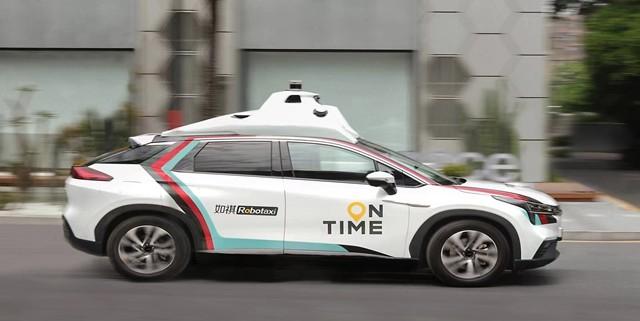More and more enterprises and capital are targeting the mobility service market in the Guangdong-Hong Kong-Macao Greater Bay Area, which is becoming one of the main battlefields for new energy vehicles and autonomous vehicles.
On April 26, Ruqi Chuxing announced the completion of a round of financing of more than 1 billion yuan, led by GUANGZHOU AUTOMOBILE Group, with the participation of enterprises such as Xiaoma Zhixing and Wenyuan Zhixing. After the completion of this round of financing, Ruqi Travel will accelerate the commercialization of Robotaxi (self-driving taxi) and build a VaaS platform (video-as-a-service model platform) that links the entire industry.
"In the past period, the industry focused on improving the system algorithm capabilities and the level of bicycle hardware, and with the development of technology, the focus began to shift to autonomous driving operation technology." Jiang Hua, CEO of Ruqi Travel, said today that robotaxi must be operated through the travel platform to truly become a service, which is why two autonomous driving technology companies have chosen to invest in Ruqi Travel at the same time.

Ruqi Chuxing was officially launched in June 2019, and the company was jointly invested and established by GAC Group, Tencent, Guangzhou Bus Group, Didi Chuxing, etc., with an investment amount of 1 billion yuan at that time. Among them, GAC Group, Tencent and Guangzhou Bus Group held 35%, 25% and 10% of the shares respectively, and other investors held a total of 20% of the shares, and another 10% of the equity was reserved for employee equity incentives. In the past three years, Ruqi Travel has been deeply involved in the Guangdong-Hong Kong-Macao Greater Bay Area, and has opened operation services in Guangzhou, Foshan, Zhuhai, Shenzhen, Dongguan and other cities, with a user scale of about 15 million and a user penetration rate of more than 30% in the core cities of the Greater Bay Area. At the annual report media briefing held on March 31 this year, Zeng Qinghong, chairman of GAC Group, said that Ruqi Travel, which is invested by GAC Group, plans to start listing next year, and Wenyuan Zhixing has invested 15 million US dollars in Ruqi Travel.
In recent years, various enterprises have accelerated their layout in the online ride-hailing market. According to data from the China Internet Network Information Center, in the first half of last year, mainland ride-hailing has covered more than 400 cities and the total order volume has exceeded 4.31 billion; as of December 2021, the scale of mainland ride-hailing users has reached 453 million, an increase of 87.33 million over December 2020.
The Guangdong-Hong Kong-Macao Greater Bay Area is one of the fiercest battlefields for major online ride-hailing platforms, in addition to the "local tiger" Ruqi Travel, there are also "Crossing the River Dragon" Didi Chuxing, Cao Cao Travel, Yao Chuxing, T3 Travel and other online ride-hailing platforms. Among them, after Seizing the Guangdong-Hong Kong-Macao Greater Bay Area market with Cao Cao Travel, Geely's Yao Travel, jointly built with Daimler-Benz, has also entered the Guangdong-Hong Kong-Macao Greater Bay Area, and is taking Guangzhou as the core to further promote the integrated operation of Guangzhou-Shenzhen-Guan-Foshan and seize high-end business customers in the Guangdong-Hong Kong-Macao Greater Bay Area. Recently, the Yao Chuxing App has been redesigned to enhance the user experience through a series of innovative upgrades. T3 Travel, a mobility service platform jointly built by FAW, Dongfeng, Changan and other enterprises, has landed in Huizhou a few days ago after its market layout in Guangzhou and other markets, continuously expanding its travel service territory in the Guangdong-Hong Kong-Macao Greater Bay Area.
At present, major travel platforms are accelerating the introduction of new technologies and new products into the Guangdong-Hong Kong-Macao Greater Bay Area, and the penetration rate of new energy vehicles in cities such as Guangzhou has increased rapidly, which is considered to be related to the large-scale introduction of new energy vehicles by these platforms. While competing with Cao Cao Travel, T3 Travel and other platforms for the number of new energy vehicles invested, Ruqi Travel began to work towards the new market of Robotaxi, and will launch the first truly open Robotaxi operation platform in the domestic travel industry, providing industry partners with Robotaxi commercial operation solutions and Robotaxi vehicle operation infrastructure, and helping the upstream and downstream of the industrial chain to jointly accelerate the commercial operation of Robotaxi.
After the completion of this round of financing, Ruqi Travel will set up a Robotaxi fleet with a scale of more than 200 vehicles to put into demonstration operation this year, and build a v2x (vehicle-to-outside information exchange) fleet with a scale of more than 1,000 vehicles, as well as promote the improvement of the autonomous driving operation system including operation platform, data platform and supervision platform. At the same time, the first store of Ruqi Car Service, a one-stop super service platform created by Ruqi Travel, has been officially put into operation in Guangzhou, exploring the road of automatic maintenance of unmanned vehicles.
However, no matter what kind of players, even Didi Chuxing, which sits on the top seat in the domestic Internet travel field, is currently difficult to achieve profitability by relying on the online ride-hailing business. The Guangdong-Hong Kong-Macao Greater Bay Area is regarded as a "super metropolis", and many travel companies hope to use this huge metropolitan area to try various ways to break through, so as to solve the problem of "profitability" of shared travel.